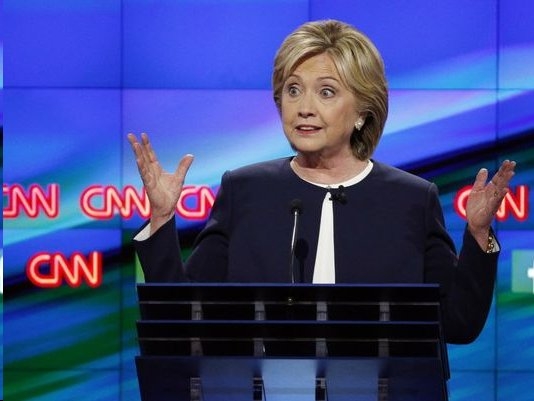Hillary won after men’s email flinch
 Hillary Clinton is going to win the Democratic nomination because her major challengers are unwilling to attack her where she is most vulnerable – the character question.
Hillary Clinton is going to win the Democratic nomination because her major challengers are unwilling to attack her where she is most vulnerable – the character question.
The email issue is a specter hanging over Hillary Clinton’s candidacy and was the 900 lb. gorilla on the debate stage going in. Democratic strategist Joe Trippi said that Clinton “has been under the gun for five months on the emails and no one has heard her message. It’s all email, email, email. So this will be the first time she has had the chance to consistently and methodically lay out her message while people are paying attention.”
But the most memorable and significant moments of debates past have been the gaffes, the slips, the jabs and the jokes. No one tunes into a debate to hear a consistent, methodical recitation of a candidate’s views on trade policy, even if she is opportunistically flip-flopping on her longstanding position to pander to labor unions. So going into the debate the biggest question was, will Hillary stumble over email?
Anderson Cooper raised the issue as the first question after the break. But he played into Clinton’s hands by raising it in the context of the upcoming Benghazi hearings. The Clinton campaign has been attempting to conflate the email scandal with the Benghazi issue, which they are casting as a partisan witch-hunt, with the inadvertent help of House Majority Leader Kevin McCarthy. In this, she hopes to have both issues dismissed as politically driven scandals without substance.
Clinton gave her canned response – the email server was a mistake, yet it was allowed, but not the best choice. She has turned over 55,000 pages of emails and answered every question. Then she launched into a diatribe on partisanship. Cooper, to his credit, pointed out that the FBI investigation was nonpartisan and even President Obama said it was a legitimate issue. “I never said it wasn’t legitimate,” she countered, after trashing the issue’s legitimacy, “I’m saying I have answered all the questions and will certainly be doing so again before this committee.”
The moment of drama came when other candidates were given the opportunity to weigh in on the issue. A well-considered blow deftly struck could have changed the course of the race. Bernie Sanders led, saying his comment “may not be great politics, but I think the secretary is right. The American people are sick and tired of hearing about your damn emails.” Hillary cackled with delight, knowing she had just won the debate.
Among the also-rans, only Lincoln Chafee said that the matter of presidential credibility was important, especially, in his opinion, since George W. Bush lied about the WMD’s in Iraq. When Cooper gave Clinton an opportunity to respond, she said no, and the crowd went wild. In that moment, the debate was over.
The Democratic men need to throw some sharp elbows to prove they are actually running for president, and not simply competing for lesser cabinet posts in the Hillary Clinton White House. They should remember that when Barack Obama’s team coined the slogan “Change you can believe in” in 2008, it was a not so subtle dig at Hillary Clinton, the candidate that no one believed even then. As an Obama campaign memo said, “’Change you can believe in’ was intended to frame the argument along the character fault line, and this is where we can and must win this fight. … Clinton can’t be trusted or believed when it comes to change … She’s driven by political calculation, not conviction, regularly backing away and shifting positions on issues ranging from war to Social Security to trade to reform.” Since no one on the stage tonight had the fire in the belly to take Clinton on the way Barack Obama did in 2008, other than the mild Mr. Chafee, they will lose. The only wildcard at this point is Joe Biden. We may yet see what Biden has learned at the feet of the one who originally took Hillary down
James S. Robbins writes weekly for USA TODAY and is the author of The Real Custer: From Boy General to Tragic Hero.
In addition to its own editorials, USA TODAY publishes diverse opinions from outside writers, including our Board of Contributors. To read more columns like this, go to the Opinion front page.


